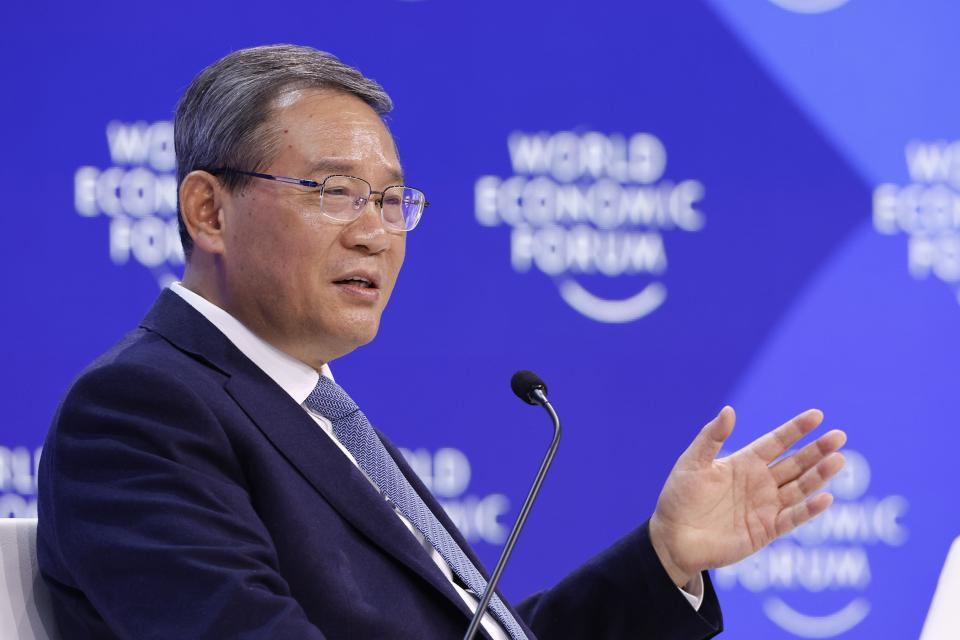China Scraps Premier Li's Briefing, Breaking Years of Convention
- Oops!Something went wrong.Please try again later.
- Oops!Something went wrong.Please try again later.
- Oops!Something went wrong.Please try again later.
(Bloomberg) -- China’s Li Qiang will become the first premier in three decades to not hold a press briefing at the annual parliamentary meetings, removing a rare platform for investors to learn more about the nation’s policy direction as President Xi Jinping consolidates control over the world’s second-largest economy.
Most Read from Bloomberg
Supreme Court Rules Trump Can Appear on Presidential Ballots
China Scraps Premier Li's Briefing, Breaking Years of Convention
Chicago to Go Ahead With Plan to Revamp Empty Downtown Towers
The country’s No. 2 official won’t take questions at the close of the National People’s Congress for the rest of its five-year term apart from in “special circumstances,” official spokesperson Lou Qinjian said at a Monday briefing in Beijing. This cohort of lawmakers will gather each year until 2027.
The annual press conference by the sitting premier has been in place since at least 1993. Scrapping one of the few events in China’s political calendar where a top leader can interact with the public comes at a moment when the ruling Communist Party is facing scrutiny over restricting access to information.
China stopped releasing some key economic data for parts of last year, such as the then-soaring youth unemployment rate, while Xi has mysteriously delayed a twice-a-decade meeting on long-term reforms, expected last autumn.
The growing opacity comes as Beijing tries to boost confidence in an economy grappling with a multi-year real-estate crisis and facing headwinds from geopolitical tensions with the US. Foreign direct investment slumped to a 30-year low in 2023, while mainland Chinese and Hong Kong stocks lost $7 trillion during a market meltdown, despite official pledges to woo foreign capital.
“This is a big loss, and yet another sign the government slowly becoming ever-more opaque, both to outsiders and even those within the system,” said Christopher Beddor, deputy China research director at Gavekal Dragonomics. Canceling the yearly briefing removes a key vehicle for the government to convey its plans in informal language and to respond to criticisms, he added.
The NPC itself had previously touted the press briefing as “one of the important windows for observing China’s openness and transparency” in a post published on its WeChat account in 2018.
Discussion of the premier’s media briefing was tightly controlled on Chinese microblogging platform Weibo on Monday afternoon, with searches only returning posts from government-linked accounts. Users shared an article celebrating past premiers’ briefings, in an apparent bid to skirt censors.
Li will still deliver the government’s annual work report at the parliament’s opening Tuesday, where he is expected to repeat last year’s growth target of about 5%. While that number is the most important policy message of this month’s huddle of thousands of delegates from across the nation, the press briefing gave past premiers a rare chance to establish a personal rapport with the public.
Former premier Li Keqiang set off a nationwide debate on poverty alleviation after complaining at the 2020 briefing that two-fifths of China’s population’s earned “not even enough to rent a room in a medium-sized Chinese city.” Those type of comments afforded him a reputation as the “people’s premier” and his passing last October triggered an outpouring of nostalgia and grief.
Before that, Wen Jiabao attracted attention for tackling sensitive questions on China’s political reforms, Tibetan monks’ self-immolation and Communist Party official Bo Xilai’s ex-police chief. “Without the success of a political system reform, the economic system reform cannot be carried out in full,” Wen said at the 2012 press briefing, appearing to contravene the party’s long-standing position it can perform economic reforms without political liberalization.
Read more: China to Unveil GDP Target, Avoid ‘Bazooka’ Stimulus at Meeting
The cancellation of the press conference is expected to further undercut the premier’s influence. The nation’s most-powerful leader since Mao Zedong spent much of his first decade in power diminishing the role of China’s No. 2, by creating new party groups that oversee policymaking once dominated by the premier, who official leads China’s cabinet, the State Council.
“This may be another way to downgrade the importance of the premier,” said Dongshu Liu, an assistant professor specializing in Chinese politics at the City University of Hong Kong. The premier used to be the highest senior official with this type of direct media channel, which has provided a venue for them to convey their personality, image and reputation, he added.
This year’s annual legislative session is also expected to be the shortest outside the pandemic in recent years, running from Tuesday to March 11. Before 2020, the annual gathering of lawmakers usually lasted 10 days or more, meaning the amount of time delegates have to offer their opinions on policy and speak to officials has been reduced.
Most of the decisions that Premier Li announces in his work report, however, have been decided months in advance, with this week’s event — like most Communist Party meetings — being a carefully choreographed affair.
In recent years, there has been a tendency to over-interpret the premier’s press conferences for indications of “internal dissent within the party,” according to Josef Gregory Mahoney, a professor of international relations at Shanghai’s East China Normal University. “Perhaps these are problems worth avoiding from the premier’s perspective,” he added.
--With assistance from Rebecca Choong Wilkins and Colum Murphy.
(Updates with more details, context.)
Most Read from Bloomberg Businessweek
Humanoid Robots at Amazon Provide Glimpse of an Automated Workplace
The Monaco Royals Whose Deals Have Brought Peril to the Palace Doors
Top Takeaways From Businessweek’s Investigation Into Monaco’s Royal Family
©2024 Bloomberg L.P.




